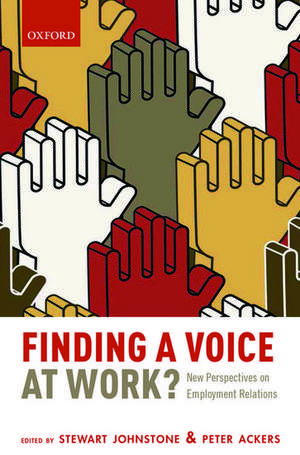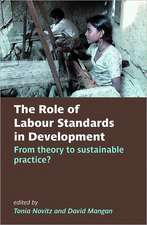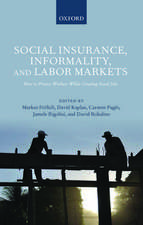Finding a Voice at Work?: New Perspectives on Employment Relations
Editat de Stewart Johnstone, Peter Ackersen Limba Engleză Hardback – 18 feb 2015
| Toate formatele și edițiile | Preț | Express |
|---|---|---|
| Paperback (1) | 331.91 lei 31-37 zile | |
| OUP OXFORD – 19 feb 2015 | 331.91 lei 31-37 zile | |
| Hardback (1) | 688.50 lei 31-37 zile | |
| OUP OXFORD – 18 feb 2015 | 688.50 lei 31-37 zile |
Preț: 688.50 lei
Preț vechi: 841.13 lei
-18% Nou
Puncte Express: 1033
Preț estimativ în valută:
131.79€ • 143.20$ • 110.77£
131.79€ • 143.20$ • 110.77£
Carte tipărită la comandă
Livrare economică 10-16 aprilie
Preluare comenzi: 021 569.72.76
Specificații
ISBN-13: 9780199668007
ISBN-10: 0199668000
Pagini: 336
Dimensiuni: 163 x 240 x 25 mm
Greutate: 0.65 kg
Editura: OUP OXFORD
Colecția OUP Oxford
Locul publicării:Oxford, United Kingdom
ISBN-10: 0199668000
Pagini: 336
Dimensiuni: 163 x 240 x 25 mm
Greutate: 0.65 kg
Editura: OUP OXFORD
Colecția OUP Oxford
Locul publicării:Oxford, United Kingdom
Recenzii
The analysis is detailed and clear, and there are nice thematic links and relationships between the chapters. The competing unitary/pluralist, organizing/partnership analytic perspectives are developed to good effect through the chapters, as is the discussion about voice in relation to Hall and Soskices varieties of capitalism. This overlap across the chapters, and the different viewpoints expressed in them, is useful for stimulating thought. The writing style should be relatively easy for students to digest, and certainly some of the chapters would be ideal for undergraduate teaching material. On this basis, the book would be an excellent library resource for those researching, teaching or learning about employment relations and voice.
There are now a lot of voices in the employee voice field. Finding a Voice at Work? stands out by bringing together an accomplished set of authors to provide diverse perspectives in a single book. From conceptual foundations to debates over British trade union strategies to perspectives from Europe and beyond, the stimulating chapters deepen the readers understanding of the fundamental question, why does workplace voice matter and which versions work best? I highly recommend this insightful collection.
This book offers important and novel insights into work and employment relations. It is essential reading for those interested in such vital workplace issues as: unions, voice, communications, performance, consultation, participation, employee involvement, and engagement.
Finding a Voice at Work? will no doubt become a benchmark text for all those researching and teaching the changing nature of employment relations. With an impressive list of leading contributors, the book examines the key question of why voice still matters for employment relations and society from a conceptual, empirical and comparative standpoint. It offers a sharp and compelling analysis for why employee voice should be at the centre of public policy debate.
There are now a lot of voices in the employee voice field. Finding a Voice at Work? stands out by bringing together an accomplished set of authors to provide diverse perspectives in a single book. From conceptual foundations to debates over British trade union strategies to perspectives from Europe and beyond, the stimulating chapters deepen the readers understanding of the fundamental question, why does workplace voice matter and which versions work best? I highly recommend this insightful collection.
This book offers important and novel insights into work and employment relations. It is essential reading for those interested in such vital workplace issues as: unions, voice, communications, performance, consultation, participation, employee involvement, and engagement.
Finding a Voice at Work? will no doubt become a benchmark text for all those researching and teaching the changing nature of employment relations. With an impressive list of leading contributors, the book examines the key question of why voice still matters for employment relations and society from a conceptual, empirical and comparative standpoint. It offers a sharp and compelling analysis for why employee voice should be at the centre of public policy debate.
Notă biografică
Stewart Johnstone is Senior Lecturer in Human Resource Management at Newcastle University Business School and was previously Lecturer in Human Resource Management at Loughborough University. His specialist teaching includes Employment Relations and Human Resource Management courses at undergraduate, postgraduate, and executive levels. A major strand of Stewarts research has been the dynamics of employee voice and participation in both union and non-union firms. In particular, his research has examined organizational attempts to develop collaborative workplace relations in pursuit of mutual gains, and assessed the outcomes of such workplace partnerships for employers, employees, and unions.Peter Ackers is Professor of Industrial Relations and Labour History in the School of Business and Economics at Loughborough University, UK. He studied Politics and Philosophy (PPE, including Sociology) at Lincoln College, Oxford University, followed by an MA in Industrial Relations from Warwick University. His specialist teaching is in International Employment Relations, British Social History and Business Ethics. Peter's intellectual interests centre on the sociological and historical aspects of the employment relationship and how this affects ordinary people and society at large. His work stresses the moderate, constructive character of organized labour, with themes of partnership and pluralism, and challenges Radical and Marxist theories of Industrial Relations.










